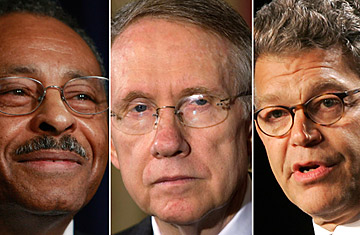
From left: Senators Roland Burris, Harry Reid and Al Franken
Only nine months ago, the 2010 electoral landscape looked ripe with promise to freshman Senator Bob Menendez, a New Jersey Democrat who assumed the helm of the Democratic Senatorial Campaign Committee (DSCC), which helps elect Democratic candidates to the Senate. Riding high with what would become a gain of eight seats (when the Minnesota recount was eventually decided in Al Franken's favor), Menendez was delighted when four Republican Senators announced their intention to retire: George Voinovich of Ohio, Mel Martinez of Florida, Kit Bond of Missouri and Sam Brownback of Kansas. President Barack Obama had carried both Ohio and Florida in 2008, and the open seats looked promising for potential Democratic pickups.
But suddenly things started changing. The political scandals surrounding Illinois Governor Rod Blagojevich and Senator Roland Burris have handicapped the Democrats' chances of keeping Obama's old Senate seat. Governors in Colorado and New York appointed two relative unknowns to fill Ken Salazar's and Hillary Clinton's shoes, respectively, both of whom left for the Cabinet. And then Ted Kennedy died, prompting a Massachusetts special election due to be held in January.
Even worse, there are at least five incumbents who are facing competitive races: Arkansas's Blanche Lincoln, Pennsylvania's new Democratic Senator Arlen Specter, Senate majority leader Harry Reid of Nevada, Connecticut's Chris Dodd and Barbara Boxer, who will face off with former Hewlett-Packard CEO Carly Fiorina in California. Reid and Dodd have some of the worst polls in the Senate — hovering near 30% approval ratings. "Illinois, Pennsylvania, Connecticut: those will be the most expensive to defend," says Nathan Gonzales, political editor of the nonpartisan Rothenberg Political Report, which tracks congressional races. "The more money you have to spend on defense takes away from what you're spending on offense."
Suddenly Menendez's smooth road is full of speed bumps. While still ahead of the National Republican Senatorial Committee (NRSC) by about $2 million — with $25.3 million to the NRSC's $23.5 million — fundraising is down 26% from the same period in 2007. At the same time, NRSC fundraising is up 23% from the same period in 2007, though Eric Schultz, a spokesman for the DSCC, is quick to point out that 2007 was a year bolstered by the epic primary struggle between Hillary Clinton and Barack Obama and that this year's numbers are more in line with the 2005 cycle. "In '05 we picked up six seats, so I'm perfectly comfortable being on the '05 track," Schultz says.
Republicans, for their part, have plenty of headaches to deal with. In the past few months, three more Senators have announced their impending retirements: Judd Gregg of New Hampshire, Kentucky's Jim Bunning and Kay Bailey Hutchison of Texas, bringing the total number of retirements to seven — the most departing GOP incumbents in one cycle in 80 years. Plus, they have vulnerable incumbents of their own to defend: Richard Burr of North Carolina and David Vitter of Louisiana, who two years ago admitted to sleeping with a prostitute. "Would I rather have zero states where we're playing defense in? Sure," Schultz says. "But at the end of the day, this is a pretty good map for us."
Still, for the first time since the 2004 elections, Republicans are seeing some glimmer of hope. They may lose seats — the Rothenberg Political Report predicts a net GOP loss of one to two seats — but candidate recruitment is up, as is fundraising. In 2008 Republicans halfheartedly contested one incumbent Democrat, Mary Landrieu in Louisiana, who won with 52% of the vote; this year they're actively challenging five sitting Dems. "We're seeing pretty invigorated conservative movement, so part of the challenge our fundraisers are having is re-creating the same excitement that we saw in 2008 — that can't be easy, especially in a bad economy," says Karen Finney, a Democratic strategist. They may not be anywhere near regaining the majority, but Senate Republicans at least have reason to believe that 2008 was their rock bottom.
